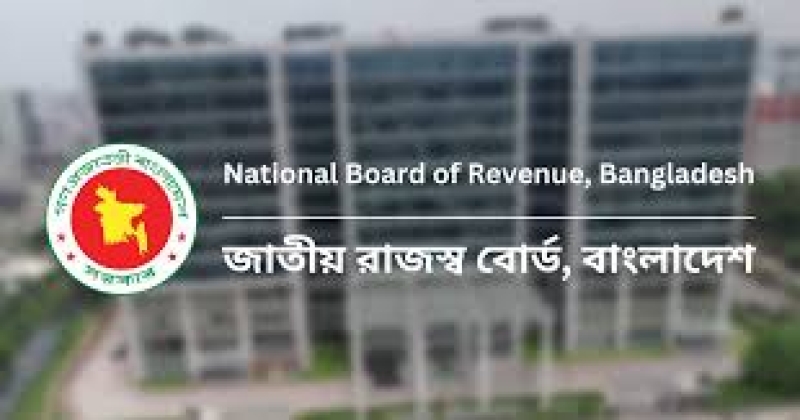- Power generation at Payra Thermal Power Plant 1st unit starts after a month |
- Irregularities, injustice will no longer be accepted in politics: Jamaat Ameer |
- 2 arrested in Jhenaidah for allegedly selling madrasa student |
- Koko’s wife campaigns for Tarique in Dhaka-17 |
- Bangladeshi Expats Cast 4.58 Lakh Postal Votes |
NBR Targets 5 Million Taxpayers by Fiscal Year-End

The National Board of Revenue (NBR) has launched an ambitious initiative to expand Bangladesh's tax base, with a target of increasing the number of active taxpayers to 5 million by the end of this fiscal year. This move aims to boost tax collection and improve the country's tax-to-GDP ratio, reducing the reliance on indirect taxes and fostering a more equitable taxation system.
Currently, Bangladesh has around 9 million Taxpayer Identification Number (TIN) holders, but only 3.5 million submit tax returns annually. To address this gap, the government has introduced several new measures to bring more individuals and businesses under the tax net.
As part of the initiative, the NBR has mandated that professionals such as doctors, engineers, lawyers, and other high-income earners obtain TINs and file annual tax returns. Additionally, individuals owning luxury items like cars or properties in upscale areas, or those with investment portfolios exceeding a certain threshold, must now file tax returns, even if they don't meet the income threshold for taxation.
A key strategy for widening the tax base is the implementation of digital solutions. The NBR has rolled out an online tax filing system that allows individuals and businesses to calculate, file, and pay taxes without the need to visit tax offices. This digital infrastructure is expected to streamline the process and increase compliance.
The NBR is also collaborating with other government agencies, such as the Bangladesh Road Transport Authority (BRTA), the Land Registry Office, and commercial banks, to identify potential taxpayers. The integration of these databases will help identify those who have yet to register or file returns, reducing tax evasion and improving compliance.
Furthermore, the NBR has introduced the e-TDS (Electronic Tax Deduction at Source) system, which ensures that tax deductions are reported in real-time. Initially implemented in major government and corporate entities, this system will soon extend to smaller businesses and professional service providers.
The NBR is also focusing on traditionally under-taxed sectors, such as real estate and e-commerce. Property transactions are being closely monitored to ensure that buyers and sellers report their incomes accurately. Additionally, digital content creators, including YouTubers and Facebook influencers, are now required to register and pay taxes on their earnings.
Another key area of focus is the informal sector, which accounts for a significant portion of the economy. The NBR is offering tax incentives and awareness programs to bring small businesses, freelancers, and self-employed individuals into the formal tax system.
To encourage compliance, the NBR has strengthened its enforcement measures, including increased tax audits and stricter penalties for non-compliance. The use of artificial intelligence (AI) and big data analytics is also being explored to identify discrepancies in tax filings.
Nationwide tax awareness campaigns are being conducted to educate citizens on the importance of paying taxes, with tax fairs, workshops, and media campaigns aiming to raise public awareness about filing procedures and the benefits of taxation.
Despite these efforts, challenges remain. The informal sector, with its minimal record-keeping, makes it difficult to assess taxable income. Additionally, tax evasion continues to be a concern, particularly among high-net-worth individuals and businesses who exploit loopholes to avoid their tax liabilities.
To address these issues, the NBR is considering further policy reforms, including reducing the tax burden on middle-income earners to encourage voluntary compliance. A universal taxpayer database is also being planned, utilizing AI-driven risk assessment tools to more accurately identify potential taxpayers.
Expanding the tax base is crucial for Bangladesh’s economic growth. Increased tax revenue will support infrastructure development, social services, and public welfare programs, paving the way for a more sustainable economy.
In line with this initiative, the government has approved the establishment of nine new tax zones across the country to improve revenue collection. The new offices will be set up in Chittagong, Cox's Bazar, Jashore, Kushtia, Noakhali, Dinajpur, Faridpur, and Narsingdi.
This move is part of a larger administrative reform that includes the creation of 28 new offices, including 20 tax zones, 4 tax appeal zones, and 4 specialized offices. Additionally, 657 new cadre posts and 3,943 non-cadre posts will be created to support the expanded operations. The changes are set to take effect immediately.

